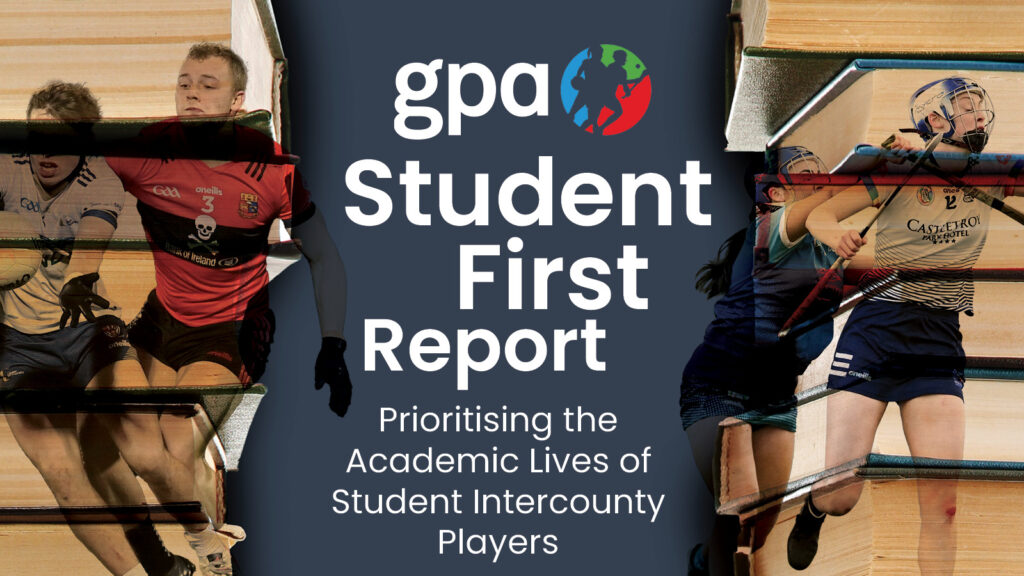The challenges faced by student inter-county players highlighted in GPA Student First Report
Overwhelmed by balancing study and playing commitments, facing serious financial difficulties and under pressure from inter-county managers in particular; these are some of the challenges faced by student athletes playing an amateur sport at elite level. These concerning findings are outlined in the Student First Report: Prioritising the Academic Lives of Student Inter-County Players which was launched by the Gaelic Players Association today.
However, there is some notable positive progress since the GPA’s last student report (pre-merger with the Women’s Gaelic Players Association) published in 2019. 86% say they are satisfied with their chosen course. 23% of male players say they have had to repeat an exam which is down 12% and 47% of male students travel home to inter-county training 3-times a week. That is down 22% from 2019.
The report’s overriding recommendation is that a rebalancing of the identity of these student athletes is needed, with an emphasis on their academic challenges rather than on their sporting commitments required. The report was authored by Dr. Aoife Lane, Head of Department of Sport and Health Sciences at Technological University of the Shannon Midlands and Dr. Fiona McHale, Mayo footballer.
Overall, 35% of the GPA’s male and female members are students. 967 of those contributed to this research which formed part of the GPA’s annual scholarship survey. Four focus groups were also carried out with the information from the survey data teased out. The key findings and recommendations are as follows:
| Key Findings | Key Recommendations |
|
1. Mitigate the impact of sport on academic studies |
|
2. Provide greater financial support for student members |
|
3. Safeguard student members’ experience of playing Gaelic games at third-level |
Commenting on the report findings, co-author Dr. Aoife Lane said; “This research provides an up-to-date picture of the experiences of GPA student members and points to a number of areas which need to be considered by Gaelic games, higher education and players themselves. While there are similar challenges for the wider student body and student inter-county players, the latter have additional demands on their time due to playing and training commitments, which ultimately impacts on their academic experience and their ability to have a sustainable part-time job.
“While any self-report research has certain limitations, the large sample size of 967 participants and the addition of focus groups gives us good confidence in this data and the picture it presents for student members.”
GPA CEO Tom Parsons added; “The motto that we work towards within the GPA is You See Players. We See People. What is concerning then is that student members of the GPA are more inclined to see themselves as players first to the detriment of their academic lives which will of course in turn impact on their professional lives in the future.
“What is clear is that there needs to be a redrawing of the balance here to allow students the environment to thrive in their chosen course first and foremost. This report has three key recommendations supported by ten key actions which will now guide our work in this area. This will be overseen by recently appointed GPA Education Manager Brian Howard.”
In 2023 the GPA provided €1.7 million of educational support to 1,176 members including its student membership. This spend was broken down between €985,000 on Third-Level Scholarships, €212,000 on an Education and Training Fund and €500,000 on Enhanced Masters Scholarships. The GPA provided €250,000 of the spend on Enhanced Masters Scholarships with that amount being matched by the universities and colleges.
GPA Education Manager Brian Howard added; “The GPA already offers extensive support to our student members but it is clear that we need to continually assess the circumstances in which they find themselves. While the findings of the report are quite concerning, it is important that we know their lived reality. This information and data has allowed very practical recommendations and associated actions to be formulated.
“I am enthused by now having a clear framework to work towards to build plans that will help deliver on the recommendations but, more importantly, that will have a positive impact of the lives of our student members.”
The full report is available to read here.













